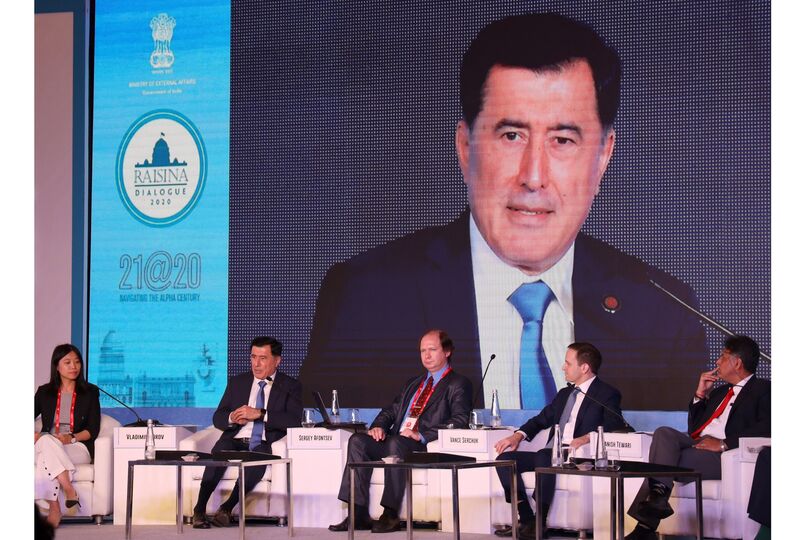On 15 January 2020, SCO Secretary-General Vladimir Norov attended the Valdai Club session titled From Vladivostok to Chennai: A New Cooperation Arc in the Rising Rimland, which was held in New Delhi within the framework of the prestigious Raisina Dialogue international conference.
Vladimir Norov said when replying to a question by moderator Timofei Bordachyov regarding the SCO's role in promoting the sweeping process of international cooperation that the SCO is home to almost half of the world's population and covers 60 percent of the territory of Eurasia, and therefore it is the key Eurasian platform for international cooperation. The SCO, given its geographical expanse from the Baltics to the Pacific, plays an active and inspiring role in world affairs.
The SCO Secretary-General updated those attending the event about the SCO's goals and tasks, the spheres and mechanisms of its cooperation, as well as the SCO's international contacts and positions when it comes to an Afghan settlement and decision-making rules. "The main principles on which the Organisation is based are openness, non-direction against other states and international organisations and the non-bloc nature. The organisation's potential for resilience lies in the fact that there is no domination, element of pressure or coercion," Vladimir Norov pointed out.
When asked about India's participation in the SCO, Vladimir Norov noted that India's accession had given the organisation a new quality and dynamics and increased its capacity to confront contemporary challenges and threats. The role of the SCO as an important mechanism for shaping regional and global policy, ensuring security and sustainable development has been strengthened.
The SCO Secretary-General spoke highly about India's efforts to further deepen mutually beneficial cooperation within the SCO and its contribution to further deepening cooperation in the fields of regional security, strengthening economic cooperation in the sphere of agriculture, medicine, IT, space, finance, development of alternative energy sources and environmental protection.
Vladimir Norov also outlined the SCO events to be held in India this year, including the meeting of the SCO Heads of Government Council, the gathering of the SCO states' ministers in charge of foreign trade and economic cooperation, as well as the first meeting of the Consortium of SCO Economic Analysis Centres.
The SCO Secretary-General updated the participants at the event about India's potential when it comes to strengthening the SCO countries' interaction in the field of transport, the improvement of rail and motorway infrastructure and transit potential, as well as the development of information technology and e-commerce.
When speaking about the SCO's priorities, Vladimir Norov pointed out that the organisation focused on security and political stability in Eurasia as the foundation for boosting economic and social development.
He emphasised the importance of promoting a healthy digital culture in the SCO space by making good use of youth potential, encouraging the young people's intellectual capabilities, skills and enterprise in the field of digital and electronic innovation, as well as by expanding the legal framework of combating cybercrime and protecting the personal data and rights of internet users.
The SCO Secretary-General also presented the SCO's plans to strengthen interaction with the UN and its special bodies plus other international and regional associations.
Other speakers at the session were member of the Indian Parliament Manish Tewari, Deputy Director of the Chongyang Institute for Financial Studies at the Renmin University of China (RDCY) Chen Chenchen, Executive Director of the KKR Global Institute (New York) Vance Serchuk, and Deputy Director of the Russian Academy of Sciences' Institute of World Economy and International Relations (IMEMO) Sergei Afontsev.
They spoke about India's role on the international stage and cooperation in the development of transport and marine corridors, the environment and the promotion of renewable energy and also answered questions that concerned the economy and environmental protection.
